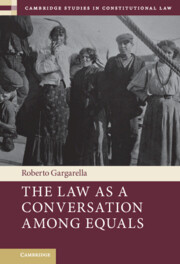Book contents
- The Law As a Conversation among Equals
- Cambridge Studies in Constitutional Law
- The Law As a Conversation among Equals
- Copyright page
- Contents
- Preface
- Acknowledgments
- 1 Constitutionalism and Democracy
- 2 The Law As Conversation among Equals
- 3 “Democratic Dissonance”
- 4 A Constitution Marked by a “Discomfort with Democracy”
- 5 Motivations and Institutions: “If Men Were Angels”
- 6 The Structural Difficulties of Representation
- 7 The Rise and Fall of Popular Control
- 8 The Periodic Vote, or “Electoral Extortion”
- 9 Checks and Balances
- 10 Presidentialism
- 11 Rights
- 12 Social Rights and the “Engine Room”
- 13 Judicial Review
- 14 Constitutional Interpretation
- 15 Constitution Making
- 16 The Birth of Dialogical Constitutionalism
- 17 Why We Care About Dialogue
- 18 “Democratic Erosion”
- 19 The New Deliberative Assemblies
- 20 Conclusion
- Bibliography
- Index
16 - The Birth of Dialogical Constitutionalism
Published online by Cambridge University Press: 25 April 2022
- The Law As a Conversation among Equals
- Cambridge Studies in Constitutional Law
- The Law As a Conversation among Equals
- Copyright page
- Contents
- Preface
- Acknowledgments
- 1 Constitutionalism and Democracy
- 2 The Law As Conversation among Equals
- 3 “Democratic Dissonance”
- 4 A Constitution Marked by a “Discomfort with Democracy”
- 5 Motivations and Institutions: “If Men Were Angels”
- 6 The Structural Difficulties of Representation
- 7 The Rise and Fall of Popular Control
- 8 The Periodic Vote, or “Electoral Extortion”
- 9 Checks and Balances
- 10 Presidentialism
- 11 Rights
- 12 Social Rights and the “Engine Room”
- 13 Judicial Review
- 14 Constitutional Interpretation
- 15 Constitution Making
- 16 The Birth of Dialogical Constitutionalism
- 17 Why We Care About Dialogue
- 18 “Democratic Erosion”
- 19 The New Deliberative Assemblies
- 20 Conclusion
- Bibliography
- Index
Summary
In this chapter, I examine what I take to be the most interesting recent development in constitutionalism, namely the emergence of “dialogic constitutionalism” -a practice that seems to be in line with the regulatory ideal defended in the book as a “conversation between equals.” The starting point of the chapter is the idea is that the system of ”checks and balances” pits the branches of government against each other, and that, in recent years, alternative practices began to develop that, in one way or another, “lubricate” the gears linking the different branches of government and favoring a more cooperative attitude between them. I exemplify these changes from two cases, one “judicial” and the other “political.” As an example of the first, I refer to the well-known decision by the new Constitutional Court of South Africa: Grootboom. As an example of the second, I refer to the now famous “nevertheless clause,” a political reform adopted in Canada. These cases allow me to describe in greater specificity what a “dialogical” approach to constitutionalism imply.
- Type
- Chapter
- Information
- The Law As a Conversation among Equals , pp. 246 - 257Publisher: Cambridge University PressPrint publication year: 2022



